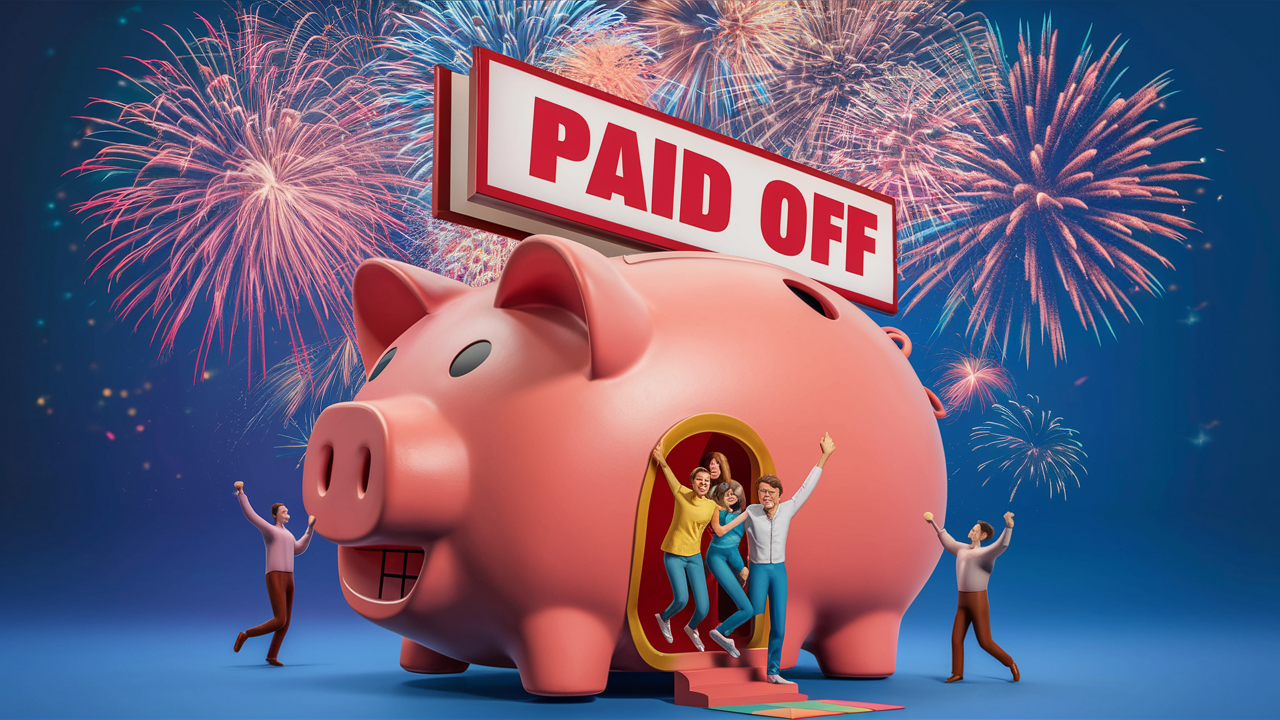To pay off a 30-year mortgage in 15 years, make extra payments towards the principal. Refinance to a shorter term if possible.
Paying off a mortgage early can save thousands in interest. Many homeowners aim to be debt-free sooner by accelerating their mortgage payments. One effective method is making extra payments directly towards the loan’s principal. This reduces the loan’s balance faster, leading to significant interest savings.
Another option is refinancing to a 15-year mortgage, which usually has a lower interest rate. It’s crucial to review your financial situation and ensure you can handle the increased monthly payments. By planning strategically, you can achieve mortgage freedom much earlier than anticipated.
Introduction To Mortgage Reduction
Paying off a mortgage faster can bring peace of mind. It means fewer years tied to debt. It means more financial freedom. Understanding how to reduce your mortgage term is key. This guide will walk you through the basics.
Motivation Behind Paying Off Early
Many people want to be debt-free sooner. This is a huge motivator. Paying off your mortgage early can give you a sense of accomplishment. It can also reduce financial stress. Imagine not having to make monthly payments anymore. This is a dream for many homeowners.
Potential Financial Benefits
There are several financial benefits to paying off your mortgage early. Let’s break them down:
- Interest Savings: You save money on interest payments. Over 30 years, interest can add up. By paying off early, you cut down on these costs.
- Increased Equity: Owning your home outright increases your equity. This can be beneficial if you need to borrow against your home later.
- Financial Security: Without a mortgage payment, you have more financial security. This can be helpful in times of financial hardship.
Below is a table showing a comparison between a 30-year and a 15-year mortgage:
| Term | Total Interest Paid | Monthly Payment |
|---|---|---|
| 30 Years | $150,000 | $1,000 |
| 15 Years | $75,000 | $1,500 |
As you can see, a 15-year mortgage can save you a lot on interest. Although the monthly payment is higher, the total cost is much lower.

Understanding Mortgage Basics
Understanding mortgage basics is crucial for anyone looking to pay off a 30-year mortgage in 15 years. Comprehending how mortgages work and the relationship between interest and principal can help you make informed decisions. Let’s dive into these essential concepts.
How Mortgages Work
A mortgage is a loan for purchasing a home. The borrower agrees to repay the loan with interest over a set period. The common terms are 15, 20, or 30 years.
Here are the key components of a mortgage:
- Principal: The loan amount borrowed.
- Interest Rate: The cost of borrowing the principal.
- Term: The length of time to repay the loan.
- Monthly Payment: The amount paid each month to cover principal and interest.
Understanding these terms will help you manage your mortgage better.
Interest Vs. Principal
Each mortgage payment consists of two parts: interest and principal. At the beginning of the loan term, payments mostly cover interest. Over time, more of the payment goes toward the principal.
| Year | Interest | Principal |
|---|---|---|
| 1 | High | Low |
| 15 | Medium | Medium |
| 30 | Low | High |
Focusing on paying more towards the principal early on can reduce the loan term. Here are some tips:
- Make bi-weekly payments instead of monthly.
- Put extra money toward the principal each month.
- Refinance to a lower interest rate if possible.
These strategies can help you save on interest and pay off your mortgage faster.
Setting A 15-year Payoff Goal
Paying off a 30-year mortgage in 15 years is a big goal. It requires dedication and smart planning. Below, you’ll find key strategies to achieve this goal.
Financial Planning
Start by reviewing your finances. Know your income and expenses. Create a budget that allows extra payments on your mortgage.
- Track your spending.
- Identify areas where you can save.
- Set aside money for extra mortgage payments.
Consider refinancing your mortgage. A lower interest rate can help. It can make extra payments more manageable. Use a mortgage calculator to see potential savings.
Creating A Timeline
Create a timeline to track your progress. This will keep you motivated.
| Year | Goal |
|---|---|
| Year 1 | Make one extra payment. |
| Year 2-5 | Increase extra payments yearly. |
| Year 6-10 | Double your extra payments. |
| Year 11-15 | Maintain consistent extra payments. |
Use visual aids like charts to see progress. Update your timeline regularly. Adjust your plan if needed.
Consistency is key. Keep making extra payments. Stay focused on your goal.
Extra Payments Strategy
Paying off a 30-year mortgage in 15 years may seem daunting. But an extra payments strategy can make it achievable. By making additional payments, you reduce the principal faster. This saves you money on interest and shortens the loan term.
Calculating Additional Monthly Payments
First, calculate how much extra you need to pay each month. Use a mortgage calculator for this purpose. Input your current loan balance, interest rate, and remaining term. Then, change the term to 15 years. The new monthly payment is your target.
Early Mortgage Payoff Calculator
For example, if your current payment is $1,200 and the new one is $1,600, you need to pay an extra $400 monthly. This extra payment will help you reach your goal faster.
Lump Sum Payments
Lump sum payments are another effective way to pay off your mortgage early. Use bonuses, tax refunds, or any unexpected money. Apply these funds directly to your principal balance.
Consider making a lump sum payment each year. For instance, a $5,000 annual lump sum can significantly reduce your loan term. This extra payment can save you thousands in interest over time.
| Payment Type | Impact on Mortgage |
|---|---|
| Monthly Extra Payments | Reduces principal faster, saves on interest |
| Lump Sum Payments | Significantly reduces loan term and interest |
Refinancing Options
Refinancing your mortgage can be a powerful tool to pay off your 30-year mortgage in just 15 years. By refinancing, you can lower your interest rate, reduce your monthly payments, or even shorten your loan term. Let’s dive into the different refinancing options available and how they can help you reach your goal faster.
When To Refinance
Timing is crucial when considering refinancing. Here are some key moments to consider:
- Interest rates drop: A lower rate can save you money.
- Improved credit score: Better credit can get you better terms.
- Increased home value: More equity means better refinancing options.
Pros And Cons Of Refinancing
Refinancing has both advantages and disadvantages. Understanding these can help you make an informed decision.
| Pros | Cons |
|---|---|
| Lower interest rate | Closing costs |
| Shorter loan term | Potential prepayment penalties |
| Reduced monthly payments | Application process |
Lower interest rates can significantly reduce the total cost of your loan. A shorter loan term helps you pay off your mortgage faster. Reduced monthly payments can free up cash for other expenses.
On the downside, closing costs can be a hefty upfront expense. There might be prepayment penalties on your existing mortgage. The application process can be time-consuming and stressful.
Budget Adjustments For Quicker Payoff
Paying off a 30-year mortgage in 15 years requires smart budgeting. Making the right adjustments can help you achieve this faster. Here are two key strategies: cutting expenses and increasing income.
Cutting Expenses
To pay off your mortgage quickly, start by reducing your expenses. Look at your monthly budget. Identify areas where you can save money. Here are some tips:
- Reduce eating out. Cook more meals at home.
- Cancel unnecessary subscriptions. Use free services instead.
- Shop for sales. Use coupons whenever possible.
- Lower utility bills. Turn off lights and unplug devices.
- Refinance your mortgage. Aim for a lower interest rate.
Increasing Income
Boosting your income can also speed up your mortgage payoff. Here are some ideas:
- Take on a part-time job. Use the extra money to pay down your mortgage.
- Start a side business. Find a niche market and provide a needed service.
- Sell unused items. Declutter your home and make some cash.
- Ask for a raise. Show your value to your employer.
- Invest wisely. Put extra money into high-yield investments.
| Expense | Monthly Savings |
|---|---|
| Eating Out | $100 |
| Subscriptions | $50 |
| Shopping Sales | $75 |
| Utilities | $25 |
By cutting expenses and increasing income, you can pay off your mortgage faster. These changes may seem small, but they add up over time. Stay committed and watch your progress grow.
Utilizing Windfalls And Bonuses
Paying off a 30-year mortgage in 15 years is a great goal. One effective strategy is utilizing windfalls and bonuses. These unexpected funds can significantly reduce your mortgage term.
Smart Allocation Of Extra Funds
When you receive a bonus or windfall, plan wisely. Allocate a large portion of it to your mortgage. This can be a tax refund, work bonus, or inheritance.
Make a plan to use these funds for extra payments. Start by paying down the principal amount. This reduces interest over time.
Consider the following allocation strategy:
| Windfall Amount | Allocation to Mortgage | Other Uses |
|---|---|---|
| $5,000 | $4,000 | $1,000 |
| $10,000 | $8,000 | $2,000 |
| $15,000 | $12,000 | $3,000 |
Using this method ensures most of the windfall impacts your mortgage. This can shorten your mortgage term.
Impact On Mortgage Term
Applying extra funds directly affects your mortgage term. Paying extra reduces the principal faster. This means you pay less interest.
Consider this example:
- Your mortgage balance is $200,000.
- Interest rate is 4%.
- You receive a $10,000 bonus and apply $8,000 to your mortgage.
By applying the $8,000, you reduce the principal to $192,000. This can save thousands in interest over time.
Consistently using bonuses and windfalls can cut your mortgage term significantly. Pay attention to your mortgage statements. Track the impact of these extra payments.
Understand the power of applying extra funds to your mortgage. This is a smart way to achieve financial freedom sooner.
The Role Of Mortgage Accelerator Programs
Paying off a 30-year mortgage in 15 years can seem daunting. But, mortgage accelerator programs can help you achieve this goal. They offer structured plans to reduce your mortgage term. You can save thousands in interest and own your home faster.
How They Work
Mortgage accelerator programs work by increasing your payment frequency. Instead of monthly payments, you make bi-weekly payments. This results in 26 payments a year, equating to 13 monthly payments. Over time, this reduces your principal faster.
Some programs also round up your payments. For example, if your payment is $950, you pay $1,000. The extra $50 goes directly to your principal. This can significantly reduce your mortgage term and interest paid.
Are They Right For You?
Mortgage accelerator programs are not for everyone. You need to assess your financial situation first. Can you afford the extra payments? Do you have high-interest debt that needs attention? Answering these questions can guide your decision.
Consider your long-term goals. Do you plan to stay in your home for 15 years? If yes, then these programs might be suitable. They can help you own your home sooner and build equity faster.
Here’s a table to help you assess:
| Criteria | Consideration |
|---|---|
| Monthly Budget | Can you afford higher or more frequent payments? |
| Other Debts | Do you have higher interest debts to pay off first? |
| Time in Home | Do you plan to stay in your home long-term? |
If you answer “yes” to these, a mortgage accelerator program might be right for you.
Potential Pitfalls To Avoid
Paying off a 30-year mortgage in 15 years is a big goal. It can save you money. But you must be aware of potential pitfalls. These pitfalls can make the process harder. Let’s explore some of these.
Prepayment Penalties
Many lenders charge prepayment penalties. These penalties apply if you pay off your loan early. It is important to check your mortgage agreement. Look for any mention of these penalties. Ask your lender if you are unsure.
Prepayment penalties can be a big cost. They can make paying off your mortgage early less appealing. If you have to pay a high penalty, it might not be worth it.
| Loan Type | Penalty |
|---|---|
| Fixed-Rate Mortgage | Usually Lower |
| Adjustable-Rate Mortgage | Usually Higher |
Neglecting Other Debts
Paying off your mortgage early is a great goal. But do not neglect other debts. Other debts may have higher interest rates. These can include credit cards and personal loans.
- Credit card debt often has high-interest rates.
- Personal loans can also be costly.
- Student loans may have lower rates but are still important.
It is wise to pay off high-interest debt first. This can save you more money in the long run.
Focus on a balanced approach. Paying off a mortgage is great, but not at the cost of other financial health.
Monitoring Your Progress
Paying off a 30-year mortgage in 15 years is a big goal. It requires dedication and consistent effort. One key to success is monitoring your progress. This ensures you stay on track and make adjustments as necessary. Below, we explore steps to effectively monitor your mortgage payoff plan.
Regular Check-ins
Regular check-ins are crucial for tracking your progress. Set a schedule to review your mortgage statements. This could be monthly or quarterly. During these check-ins, look at how much principal you’ve paid down. Compare this with your goal.
Use a simple spreadsheet or an app to record your payments. Note any extra payments made. Calculate how much time you’ve shaved off your mortgage. Seeing progress can be motivating.
Adjusting The Plan As Needed
Life is unpredictable. Your financial situation might change. Be ready to adjust your plan. If you get a bonus or a raise, consider applying it to your mortgage. Conversely, if unexpected expenses arise, you might need to pause extra payments.
Review your budget regularly. Make sure it aligns with your mortgage payoff goals. If you find you’re struggling, look for areas to cut costs. Small adjustments can make a big difference over time.
| Step | Action | Frequency |
|---|---|---|
| 1 | Review mortgage statements | Monthly |
| 2 | Record payments | Monthly |
| 3 | Adjust budget | Quarterly |
| 4 | Plan for bonuses | As received |
Monitoring your progress is about staying proactive. Regular check-ins and adjustments help you stay on track. Keep your goals in sight and remain flexible. This will make paying off your mortgage in 15 years achievable.
Success Stories
Many people dream of paying off their mortgage early. Real-life success stories can inspire you. Learn how others paid off their 30-year mortgage in 15 years.
Key Takeaways
- Consistency: Regular extra payments make a big difference.
- Bi-weekly Payments: This strategy adds one extra payment each year.
- Refinancing: Lower rates mean less interest over time.
These strategies can help you too. Start today and watch your mortgage shrink. Plan, stay committed, and achieve your goal.
Frequently Asked Questions
Can I Pay My 30 Year Mortgage Off In 15 Years?
Yes, you can pay off a 30-year mortgage in 15 years by making extra principal payments. This reduces interest costs. Ensure your lender allows extra payments without penalties.
What Happens If I Pay Two Extra Mortgage Payments A Year?
Paying two extra mortgage payments a year reduces your principal faster. This shortens the loan term and saves on interest.
What Happens If I Pay An Extra $200 A Month On My Mortgage?
Paying an extra $200 a month on your mortgage reduces your loan’s principal faster. This cuts down interest costs and shortens the loan term. You build equity in your home quicker, improving financial stability. It can lead to significant savings over the life of the mortgage.
What Is The Fastest Way To Pay Off A 30 Year Mortgage?
Make extra payments towards the principal. Refinance to a shorter term with a lower interest rate. Trim unnecessary expenses.
Conclusion
Paying off a 30-year mortgage in 15 years is achievable with strategic planning. Focus on extra payments and budget adjustments. Prioritize high-interest debts and maintain financial discipline. With determination, you can enjoy a debt-free life sooner. Your future self will thank you for the commitment and effort.

Lydia Short is a distinguished figure in the realm of “how-to” business expertise, known for her insightful guidance on navigating the intricacies of entrepreneurship. With a comprehensive background in business strategy and management, Lydia Short has emerged as a go-to expert for practical advice on starting, growing, and optimizing businesses. Her career is defined by a commitment to demystifying the complexities of business operations and providing actionable insights to aspiring entrepreneurs. Whether elucidating effective marketing strategies, streamlining operational processes, or offering guidance on strategic decision-making, Lydia Short’s expertise encompasses a wide spectrum of business-related topics. As a “how-to” business expert, she serves as a valuable resource, empowering individuals with the knowledge and tools needed to turn entrepreneurial visions into successful ventures. Lydia Short’s contributions continue to shape the landscape of business education, making her a trusted mentor and advisor for those navigating the challenging yet rewarding journey of entrepreneurship.


